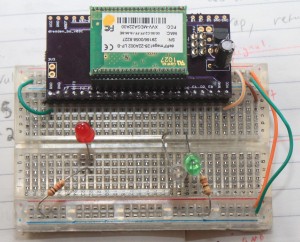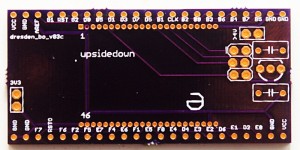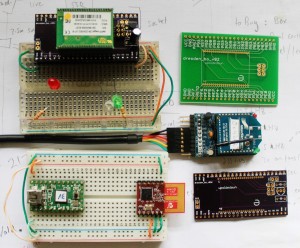I’ve just substantially updated my library code for dealing with Microchip’s MRF24J40 modules on AVR microcontrollers, making it much much easier to use. It’s now based on callbacks for handling rx/tx packets, so you don’t need to know anywhere near as much about the module’s internals anymore. The tradeoff is a bit more ram usage.
mrf_reset and mrf_init now take parameters to ports and pins, so you no longer need to mess around with defines in the library headers any more.
#include "lib_mrf24j.h" mrf_reset(&PORTB, PINB5); // reset pin mrf_init(&PORTB, PINB0); // chip select pin |
You no longer need to manually work with the interrupts, you just need to set up the ISR for the pin you’ve chosen to connect to the MRF24J40’s INT pin, for example, for my case, using INT0. (Remember to add a EIMSK |= _BV(INT0); somewhere too!)
ISR(INT0_vect) { mrf_interrupt_handler(); } |
The interrupt handler takes care of reading in received rf data, and keeping it in a local buffer. It always contains the most recent packet. To do something with the received data, call mrf_check_flags() pretty often. It takes two function pointers as parameters, one which will be called for rx, and one for tx. Here’s a snippet from my main().
// set the pan id to use mrf_pan_write(0xcafe); // set our address mrf_address16_write(0x6001); while (1) { // Call this pretty often, at least as often as you expect to be receiving packets mrf_check_flags(&handle_rx, &handle_tx); if (time_to_send()) { mrf_send16(0x4202, 4, "abcd"); } } |
And here’s some example rx/tx callback handlers.
void handle_rx(mrf_rx_info_t *rxinfo, uint8_t *rx_buffer) { printf_P(PSTR("Received a packet: %d bytes long\n"), rxinfo->frame_length); printf_P(PSTR("Packet data:\n")); for (int i = 0; i <= rxinfo->frame_length; i++) { printf("%x", rx_buffer[i]); } printf_P(PSTR("\nLQI/RSSI=%d/%d\n"), rxinfo->lqi, rxinfo->rssi); } void handle_tx(mrf_tx_info_t *txinfo) { if (txinfo->tx_ok) { printf_P(PSTR("TX went ok, got ack\n")); } else { printf_P(PSTR("TX failed after %d retries\n"), txinfo->retries); } } |
The library code is available here, and also on github (lib_mrf24j)
Complete demo code for a module connected to a PJRC Teensy 2.0 board is here and also on github (You’ll probably have to edit paths in the Makefile)


